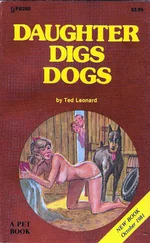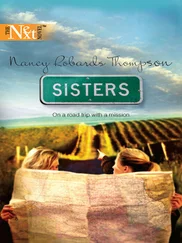There were, however, signs of habitation. At the field’s eastern edge, near the lane and partially sheltered by the trees, a blue tarpaulin on poles shaded a motley collection of folding tables and canvas chairs. The upper half of the field had been marked out with a gridwork of staked ropes and pennants on thin rods. Between the tarpaulin and the grid lay a trail of buckets, brushes, sieves, and trowels—the tools of the archaeologist’s trade.
Katrina Graham, dressed in a blazing orange tank top, a red sweatband, and a pair of baggy shorts, was emptying a bucket of dirt into a wheelbarrow at the center of the grid. She paused to look up as our car rumbled into view. Adrian, clad in his dusty work clothes and disreputable hat, sat in a folding chair beneath the blue tarpaulin, with a large sketch pad propped on the table before him. The moment he spied the Mercedes, he jumped to his feet and hurried toward the lane.
Rainey was as good as gold. She didn’t budge until Francesca had removed the key from the ignition, released her seat belt, and unlocked the doors. Then she exploded from the car and tore across the field like an escaping convict.
“Whoa,” said Adrian, scooping her up as she came within reach. He set her on her feet and placed his hands on her shoulders. “You’ll have to be more careful, Rainey. We don’t want you tripping over those ropes.” He lifted his head and shouted, “Miss Graham!”
Katrina dropped the bucket into the wheelbarrow and trotted down the sloping field to Adrian’s side. Her skin glistened with sweat and her headband was soaked through, but she didn’t seem in the least fatigued. “Yes, Dr. Culver?”
Adrian bent to retrieve the hat that had tumbled from Rainey’s head. “We have a new recruit,” he said, placing the hat back where it belonged. “Please see to it that Miss Dawson is issued with sunscreen, then show her how to utilize the waste dump.”
Katrina gave a husky laugh. “Yes, sir,” she replied. “Come along, Miss Dawson.” She took Rainey’s hand and led her to the work area beneath the tarpaulin.
Adrian strode over to the Mercedes. “Welcome to Scrag End, Lori. I’m so glad you’ve come.”
I eyed him doubtfully as I extricated Will from his car seat. “ The waste dump?”
“It’s where we put the soil we’ve removed from the trial trench,” Adrian explained. “It seems the best way to deploy Rainey’s talents.”
“Oh,” I said. “I’m new at archaeology.”
“You’ll be an old hand by the time you leave here today. Please, Miss Sciaparelli, allow me.” Adrian hurried over to help Francesca lift the strollers from the trunk.
“Thank you for the flowers,” Francesca murmured, concentrating on unfolding Rob’s stroller. “It was kind of you to bring them.”
Adrian wobbled slightly, as though staggered by Francesca’s passionate words. “I’m . . . you’re . . . it’s . . .” He might have gone on all day if I hadn’t intervened.
“Adrian,” I said, “would you please hold Will while I get Rob?”
Adrian stopped stuttering. “Me?” he said, retreating a step or two.
“Just for a second,” I coaxed. “My son won’t bite. He can’t. His teeth haven’t come in yet.”
Adrian took a deep breath and wiped his palms on his shirt. He stood stiffly at attention as I placed Will in his arms, but my son was adept at dealing with inexperienced adults. Will wriggled and squirmed until Adrian loosened up, then snuggled his head into the crook of Adrian’s neck.
The look of abject terror faded from Adrian’s eyes. “Such soft skin,” he murmured. “ The sun won’t do it any good at all, old chap. We must get you into the shade.”
I turned to inform him that Will’s stroller had a perfectly adequate awning, but he was already striding toward the tarpaulin, with my son cuddled close to his chest.
Francesca seemed taken aback by his desertion. As she clicked the sturdy awning into place, she muttered, “You’d think the man had never held a babe before.”
“Maybe he hasn’t,” I said.
“A man his age?” Francesca protested.
“Bill never held a baby until he had his own. Does Adrian have any children?” I asked, putting Rob in the stroller.
“No,” said Francesca, “nor a wife, neither.” She flushed suddenly and bent low over Rob’s straps. “Or so I’ve heard.”
Katrina was still annointing Rainey with sunscreen when Francesca, Rob, and I arrived at the tarpaulin. Adrian had returned to the folding chair near the propped sketch pad and appeared to be entirely absorbed in watching Will grasp his index finger. While I piled an empty table with the miscellaneous baby-bags, he peered curiously from one twin to the other.
“How do you tell them apart?” he asked.
Rainey piped up unexpectedly: “You look in their eyes.”
All heads turned in her direction, but Francesca was the first to speak.
“What d’you mean, Rainey?” she asked.
“I . . . I don’t know,” said Rainey, unnerved by the attention her remark had drawn. “It’s just that . . . when I look at Will, Will looks back at me. And when I look at Rob, Rob looks back at me.”
Francesca’s full lips curved into a slow, sweet smile as she bent down to lift Rainey’s chin. “It’s their souls you’re seeing,” she told the little girl. “You can’t mistake one soul for another, any more than you can mistake a cat for a cabbage. D’you see?”
Rainey nodded eagerly. “Rob’s is silvery blue and Will’s is sort of golden. Is that what you mean?”
Francesca gave an astonished laugh. “I believe you see ’em more clearly than I do,” she said. “Those are the lights of their souls, sure enough.”
I looked from Rainey to my boys. I’d always been able to tell Will and Rob apart, but I’d never known how to explain it to the nurses or Dr. Hawking or anyone else who asked—leave it to an eight-year-old to do it for me.
“Your soul is a soft, dark brown,” Rainey added, gazing into Francesca’s eyes, “like Mummy’s brown velvet hat. Isn’t that right, Dr. Culver?”
Adrian fielded the question gamely. “I’ve, er, never seen your mummy’s hat,” he replied.
“I’ll ask her to wear it to my party,” Rainey assured him. “Mummy can stand next to Francesca and you can stare into Francesca’s eyes, the way you always do, and—”
“Dr. Culver,” Katrina interrupted. “Do you think we’ll be much longer? We have to get those soil samples back to the lab for analysis.”
Adrian had all but buried his face in Will’s T-shirt. Now he got up, with my son cradled in his arm, and bustled over to one corner of the work area to retrieve a dirt-filled bucket.
“The soil samples can wait until our guests have departed,” he said, carefully avoiding Francesca’s eyes. “I believe you were about to show Rainey the waste dump. While you’re there”—he handed the bucket to Katrina—“don’t forget to discard this detritus, as well.”
It was a gentle reproof, but a reproof all the same, and Katrina didn’t take it well. She shot a hostile glance at Francesca before trudging across the field to the wheelbarrow, with Rainey trotting happily in her wake.
“Miss Graham is apt to take her science a bit too seriously,” Adrian observed when Katrina was out of earshot.
“She’s sweet on you,” Francesca commented, eyeing the muscular little blonde dispassionately.
Adrian looked alarmed. “Surely not,” he protested.
“Plain as the nose on your face,” Francesca told him, taking Will from his arms. “And why shouldn’t she be? You’re the famous professor, the man with all the answers.”
“I can assure you that I have far more questions than answers,” Adrian said, with a self-deprecating wave of his hand. “But I am being remiss in my duties. Won’t you have a seat? May I offer you a glass of cold water?” Adrian tossed his hat aside, opened an ice chest, and took from it a bottle of the springwater Katrina had ordered from Mr. Taxman at Kitchen’s Emporium. He filled a pair of plastic cups.
Читать дальше








